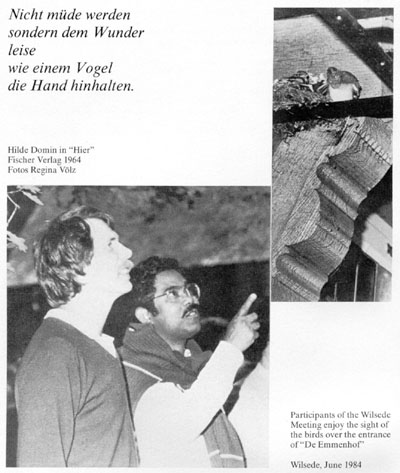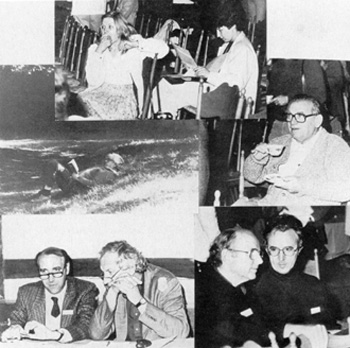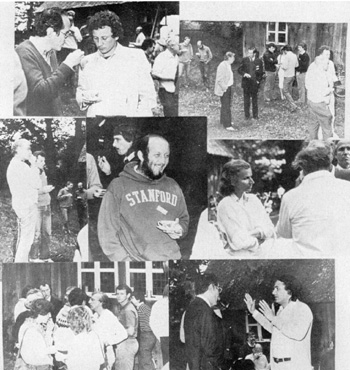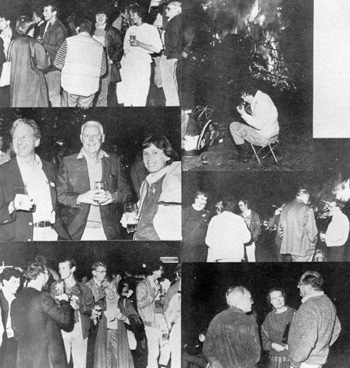|
|

In June 1984 a total of 169 physicians, scientists and students assembled in the now familiar and much-loved lair in the Wilsede Luneberg Heath near Hamburg, Germany, for the sixth biennial conference on Modern Trends in Human Leukaemia. This meeting, conducted by Prof. Rolf Neth in his own inimitable style, has established itself as one of the major events in the all too crowded programme of international conferences on leukaemia, cancer and related topics. Some may ponder why, with its "rustic" setting flies, equine deposits, and lack of easy exit -, Wilsede has such an irresistible and persistent lure for so many of the world's top practitioners of leukaemia research? The answer is, I suspect, a cocktail of Rolfs extraordinary charm, the pleasure or meeting friends and colleagues in a uniquely informal and relaxed atmosphere and the special style of the proceedings themselves, which focus on the evaluation of ideas and hypotheses rather than the cataloguing of data. Indeed the sixth Wilsede meeting maintained the usual high standard of highly original presentations, with Anders (the "fish" man), Duesberg, Ohno, Mitchison and Coutinho, and others providing incisive challenges to "conventional wisdom" and great entertainment. Carlo Croce sang a marvellous aria on the myc gene and Bob Gallo managed to get in a few words about quite an interesting-looking human retrovirus. It all looked pretty good to me, although Peter Duesberg expressed some powerful reservations about the significance of these latter findings. The two Fred Stohlman memoriallectures (this year by Duesberg and Mitchison) again provided high spots of the meeting. On a sober and sad note, this meeting was marred by the loss during the preceding year of three outstanding scientists who have helped make Wilsede the success that it is: Henry Kaplan, Dick Gershon and Sol Spiegelmann. All three epitomised what is best about the Wilsede meeting and science itself, with their striking originality, debating skill and warm friendship. They will be sadly missed. As a token of respect to Henry Kaplan, the Henry Kaplan Awards for the best posters by young investigators were introduced at the sixth meeting. Ken McCredie was presented with a special award to mark both the sheer audacity of his presentation and his special affection for the wild life of the Luneberg Heath. The Wilsede meetings have proved the ideal forum for practising physicians and basic scientists to meet together and discuss new innovations from molecular biology to treatment strategies. The "educational" component of Wilsede, enjoyed by both students and golden oldies alike, is not to be underestimated; in an increasingly specialised, technical and rapidly developing research arena it serves a vital function. If, as we all hope, the exciting discoveries in (proto- )oncogenes in leukaemia and monoclonal antibody manipulation of leukaemic cells are to lead to new forms of diagnosis, monitoring and treatment of leukaemia and lymphoma, then Wilsede is the place which will foster the creative skills required. As in previous Wilsede meetings, the organisers wish to express their thanks to the session chairmen for their help with the programme and emphasise their continued gratitude to Dr. Alfred Toepfer and his associates for keeping the Naturschutzpark Lüneburger Heide the delightful and unspoilt place that it is. We are particularly fortunate that the future of these meetings has now been assured by a generous biennial grant of DM 100000 from the Erich und Gertrud Roggenbuck-Stiftung zur Krebs hilfe, Hamburg, to be administered by the Dean of the Faculty ofMedicine at the University of Hamburg, Prof. Karl H. Hölzer. XXVI 


Personal and scientific discussion around and in " De Emmenhof " Wilsede, June 1984 |